
"I had no regrets until I met you"
Happy Together was a haunting, gut-wrenching look at love and loneliness with stellar performances by the main cast. Tony Leung Chiu Wai and Leslie Cheung played an on again, off again couple who were often lonelier when they were together than when they were apart.Ho Po Wing and Lai Yiu Fai have traveled from Hong Kong to Argentina. On a trip to see the Iguazu Falls they become hopelessly lost and Ho breaks up with Lai and not for the first time. Lai finds work as a club doorman while Ho starts turning tricks to make a living. As Lai watches Ho with other men, a deep sorrow and homesickness overtakes him. He doesn’t want to inevitably “start over” as they usually do, he wants to go home to Hong Kong. He needs to make enough money first. When Ho is beaten by one of his clients, Lai lets him in and takes care of him, but refuses to sleep with him. At a new job, Lai makes friends with Chang, a young man from Taipei, which causes friction between the two lovers.
Ho and Lai were in a “can’t live with him, can’t live without him” dynamic. Ho had a reckless streak that Lai tried to tame, but would cause Ho to chafe at the constraints. Every scene was filled with raw emotions-longing, agony, passion, and despair. While Leslie Cheung gave a wonderful performance as the erratic Ho, it was Tony Leung who captivated me with his. I’ve seen Tony in numerous films, but this was the best performance of his I’ve seen so far. He has never had a problem with the too cool for school vibe, but in this film, he tore through emotions left and right without going over the top. It was impossible to not empathize with Lai when the heartache and misery were visibly eating away at him. In a scene where Ho taught him how to dance, the desire not just for this man, but also a longing for something more, something unattainable was quite moving.
A young Chang Chen as Chang Wan brought a breath of soothing air into Lai’s life. The friendship was easy and a reminder of home. Chang had a tender scene as he tucked a sorrowful, intoxicated Lai into bed. Their friendship was a lifeline for the floundering Lai. When Chang left Buenos Aires, Lai was truly adrift and found that “lonely people are all the same.” Lai became more convinced he did not want to ever “start again” with Ho, regardless of his deep feelings for him. Ho was like the prodigal son who had to occasionally self-destruct knowing that Lai would always be there for him in some capacity.
This film had Wong Kar Wai’s trademark palette of greens, yellows, and reds along with scenes in black and white. There is no denying his aesthetic gift, but sometimes I don’t connect with the story he’s telling. Happy Together connected everything for me. The plot was thin, almost non-existent, as these men struggled to make a living and struggled to alleviate their desire to return home and to somehow survive their complex disparities. I thoroughly enjoyed the varied music, which ranged from Tango Apasionado to fittingly enough, Happy Together originally by The Turtles. The songs flowed naturally through the film as stark emotions ebbed and rose.
Happy Together’s unflinching exploration of a tempestuous relationship was hard to watch at times, but impossible to look away from. Tony Leung peeled back his stunning façade and poured out an impressive array of emotions both nuanced and heartbreakingly real. Much like the Iguazu Falls, Ho and Lai’s bond was powerful, chaotic, captivating, murky, and completely unforgettable.
8 May 2024
Was this review helpful to you?

"There's always a cause that results in consequence"
An Ancient Love Song may have been a low budget, shorter Cdrama, but longer, more expensive Cdramas could learn a lesson or two from it. The story was written well and the writers believed in the old adage, “Give them what they need, not what they want.”Shen Bu Yan is on a book tour touting his most recent title which covers the Demon Queen during the Nine Kingdom era. After an argument with his editor, he encounters an old woman selling trinkets to tie to an ancient wishing tree. He spots a broken jade pendant he’d seen in a dream the night before. Back at home his editor tells him he’s required to write a trilogy despite not having any more research for such books. A drop of blood touches the pendant from a nosebleed and he finds himself at the Great Sheng Palace in ye olden times. The Demon Queen is expecting him and the game is on.
I don’t know how this drama passed the censors and the “no time travel” edict, maybe Shen Bu Yan’s jade pendant dazzled them or there was enough standard warfare propaganda to appease them. Whatever the reason, I’m grateful. I’ve never seen Zhang Ya Qin in a lead role before and thought she played Lu Yuan well regardless of the character’s age. She brought Lu Yuan's patient love for Shen Bu Yan to life as well as Lu's determination to do the right thing. And a definite plus, she was no shrinking violet in a fight. Guo Jia Nan as Shen went from hapless fish out of water to strategist just as believably. The two had a nice chemistry despite the characters’ brief interludes throughout the story as each was traveling in different directions. I admire the writers for bringing the drama to a logical end, as logical as time travel dramas can be. Although no one seemed to be concerned about the Butterfly Effect.
Though not a big budget drama An Ancient Love Song was impossible for me to stop watching once I started. It took only the first episode to realize, one’s life and heart was set in “drive” and the other’s was in “reverse”. Forever in each other’s minds yet never quite together, it was a heart wrenching ride as they attempted to save each other and the kingdom, always hoping the next glimpse of the other would be forever.
3 April 2024
Was this review helpful to you?
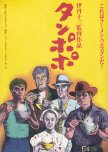
"You helped me find my ladder"
From birth to death, we all have the need for food in common. Tampopo put a weird twist on the food genre by combining it with a Western, with the emphasis on weird. The film’s main course was the search for the perfect bowl of ramen. The side dishes ran the gamut from heartwarming to sexual food fetishes. When the character in the opening scene breaks the fourth wall, hold onto your popcorn because you are in for a wild ride.On a dark and stormy night, two truck drivers ride into town looking for a place to eat. Goro wears a cowboy hat and his trusty young sidekick loves ramen so they stop at small shop. Tampopo is a widow with no experience cooking ramen and it showed. Goro and Gun give her advice on her ramen and before long are helping her to improve. Team Ramen begins to expand to include a homeless ob/gyn, a chauffeur, and a drunken contractor. And this is the most normal story in the film.
Just when you think it couldn’t get any weirder, director Itami Juzo says, “Hold my Heineken.” Like tag team wrestling, a passerby will be tagged in and their story of food begins. Professional and international dinner etiquette, con artists, fetishes, first times, and last times all pop in and out with circle wipes. Tampopo delves into the connections we have with food and dining. How much do we savor and pay attention to what we eat? How memories and food are tied together in a family. There were some scenes with the 18+ food fetish couple that I would rather not have seen but for the most part the vignettes were PG, kooky, and entertaining. When the last breaths of a character were for a wild boar intestines recipe you know the director is hard core about food. While I found myself invested in one of the romances, the true love of the film was for food.
Tampopo will not be for everyone, nor will all the stories in it. I enjoyed Team Ramen as they explored the world of ramen, experimenting, failing, improving, and building a comradery. Some of the vignettes were more humorous than others, but overall, I found it quirky and entertaining. As someone who grew up watching westerns with my dad, I fully expected one character to shout out, “Come back Shane!” at the end of the film. If you are in the mood for something different, grab a snack, and settle in for a film dedicated to food in the many ways we celebrate it.
7 February 2024
Was this review helpful to you?
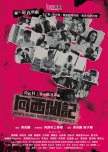
Bleak look at dating and love in Hong Kong
Everyone in Hong Kong West Side Stories was looking for love or to get an itch scratched and they didn’t care if they had to lie, cheat, or kill to make it happen. Six vignettes over 12 short episodes focused on different characters though there was some overlapping. These stories were from a decidedly male point of view filtered through the Black Mirror.The first 3 episodes featured two unlikeable men. Both received exactly what they deserved. Episode 4 was my favorite and even though it took a rather bleak, monetary look at dating, at least the couple was engaging. Episode 5 was about perception and sex in a public place. Warning--this drama has several scenes with people having sex or talking about it graphically. Episodes 6 and 7 caught me by surprise, falling under “be careful what you wish for.” Episode 8 focused on scams and a young man who was willing to work(out) for the possibility of love. 9 had a trippy twist to it. A virgin in episode 10 misconstrued messages and missent one as well. 11 and 12 gave new meaning to sibling rivalry with utterly vile behavior.
Women tended to be shown in a mercenary light or as bright as a 10-watt bulb. There were a couple of intelligent women but they were anomalies. There weren’t many episodes where a woman’s role extended beyond being in a man’s sexual crosshairs. The men couldn’t understand why they were alone or the good women didn’t want them. Um, cheating, lying, being obsessed with porn, strange or obsessive behavior or not being able to look a woman in her eyes because their gaze traveled further down. There was a “comedic” twist in one vignette that crossed the line where a woman’s consent is concerned. Despite being well made, too often instead of hoping for a happy ending for these characters I was completely revolted by them. Nearly everyone was screwing, being screwed over or screwing someone else over.
Many of the characters faced the problems of not making enough money to either pay rent or buy an apartment, much less a car. They often worked long hours with little reward. Lonely and desperate they sought out companionship in one form or another whether it was looking for love or looking to score. Friendships were as rare as healthy romantic relationships.
Hong Kong West Side Stories offered a few intriguing stories with disquieting twists. If you are in need of a feel good drama, this is not it. I found the majority of stories to be dark and depressing with people constantly self-sabotaging themselves. Though described as a dark comedy there wasn’t much to laugh about.
28 January 2024
Was this review helpful to you?
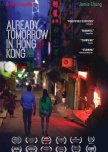
Worth the trip
Already Tomorrow in Hong Kong was a short, sweet romantic stroll through scenic Hong Kong. If Before Sunrise (1995) was made by the Hong Kong Board of Tourism this is what you might get.Ruby is a Chinese American visiting Hong Kong on business who needs help finding her friends one evening in the bustling city. Josh, an American ex-pat, overhears her problem and offers to show her the way. He’s in finance but wants to be a novelist and she designs popular talking toys but wants to own a boutique for designer clothes. The two click as they walk and talk, the only problem being he has a girlfriend. A year later, they unexpectedly meet again on a ferry. Once again, they spend an evening walking and talking. This time she’s attached to someone else as well.
Josh’s girlfriend doesn’t understand his American pop culture comments while Ruby’s sassy comments go right over her boyfriend’s head. Free spirit Ruby is in a highly structured relationship while Josh’s girlfriend is too afraid to tell her parents that she’s been dating a white guy for two years. The evening walks cause each to reevaluate their current relationships. Josh and Ruby are attracted to each other on physical and intellectual levels. This doesn’t mean they are perfectly made for each other. He loves Hong Kong, exploring and learning about his surroundings and the people while Ruby tolerates it and can’t wait to go home.
Bryan Greenberg was perfect as laidback Josh who enjoyed the beauty and entertainment of Hong Kong. Jamie Chung radiated energy as Ruby cut through the subterfuge with her lightning wit. I did not envy her walking around the city in her high heels though. Richard Ng made a brief appearance as a fortune teller whose bird did most of the work. The real star of the film was Hong Kong’s nightlife with colorful lights and streets filled with people. The couple traveled on foot, by bus, cab, ferry, and escalator. The two were drenched in the hues of golden lamplight and the technicolor of neon lights, spurred on by the verve of the city and their burgeoning feelings for each other.
"When are you ever 100% sure about anything?"
Unlike Before Sunrise, I enjoyed the casual conversations Josh and Ruby engaged in. Flirty and honest (ultimately), they sounded like two people getting to know each other and finding the familiar rhythm of a kindred soul. They weren’t callous adulterers, they were two people walking and talking who over the course of two evenings, set a year apart, began to understand that their conversations were leading to deeper feelings for each other. More importantly, their time together shed light on serious issues in their current relationships. What did they want to do?
For people unfamiliar with Hong Kong, like myself, the strength of this movie was the gorgeous tour of the city. Josh and Ruby may have decided to be together tomorrow in Hong Kong or for her to return to yesterday in Los Angeles. Either way we’ll have the memory of two beautiful nights in a fascinating place.
19 January 2024
Was this review helpful to you?
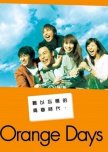
"The evening sun shined on us like a freshly picked orange in the sky"
Orange Days brought out the sweet and sour times for five students in their final year at university. This coming-of-age drama explored friendships, hardships, romance, and finding their place in the world. I watched Orange Days during its 20th anniversary year and its stories of life and love still hold up even if the technology and styles were dated.Kai, Shohei, and Keita are friends at university. Kai and Shohei are still trying to figure out what they want to do when they graduate while Keita knows his future is in his family’s wedding business. One day Kai comes across a young woman, Sae, playing the violin and his world is turned upside down. Sae and her friend Akane are slowly integrated into the group, eventually called the Orange Group which has its own spiral notebook in the lounge for the members to write down their thoughts for each other.
I was pleasantly surprised that the male lead, Kai, was a nice guy. Too often in older dramas, the MLs were cold alphas. Sae was the cold and volatile character in this story. A musical prodigy and on her way to fame and fortune she lost her hearing which caused her to close her heart off. Shohei was the player of the group, but Akane quickly sussed out that he had a heart of gold under his sarcastic exterior. Poor Keita ended up being the fifth wheel, unlucky in love but still supporting the others.
True to life at university, the characters were struggling to figure out who they were and where they were going. Having a degree and knowing exactly what to do with it are often two different things. And much like in real life, the lovers often made mistakes, sometimes stupid ones as they discovered what made each other tick and what ticked each other off. The group began to learn sign language so that Sae would not feel left out. If there was anything that didn’t feel realistic it was that a lot of people became fluent in sign language quickly when it would be like learning a foreign spoken language. Sae's desire to cling to her gift of music provided for numerous violin and piano solos along with the classical background music which I greatly enjoyed. The drama didn’t shy away from showing how her disability affected her skill sets.
Tsumabuki Satoshi gave a gentle performance as Kai with the porcupine hair who wanted to be a handrail for people to help them up and be their best selves. Shibasaki Ko had the more difficult role of Sae, conveying all of her complex emotions without saying a word. I tried to not give up on Sae. She could occasionally come across as a temperamental toddler, her volatile moods swaying back and forth. Her character growth was slow and as often happens she took a dramatic step backward in the last episode which was nearly the breaking point for me. For the most part, Kai would call her on her selfish actions and cruel words.
Orange Days highlighted the time in life when the bonds of friendship were vibrant and love could be elusive, rapturous, and excruciating. The group attempted to squeeze all of the joy and meaning they could out of their days, knowing that they were on the cusp of adulthood. If I could change anything it would have been Sae’s impulsive and self-protective decisions in the last episodes. But as in real life, change is hard and takes time and most people will slide back into old behaviors before making lasting transformations. Watching these young people face their unknown futures with hope and enthusiasm was addictive and comforting, well worth trying out.
9 January 2024
Was this review helpful to you?

This review may contain spoilers
"At the Louvre I saw the Black"
Kishibe Rohan takes his supernatural ability to read people like a book on the road to Paris. At the Louvre he will confront a relentless evil residing in a hidden painting. The story jumps back and forth in time with much of the story told in the past. Fair warning: If you have arachnophobia you will want to avoid this film at all costs.Rohan is working on a new manga and after remembering a story about the blackest of blacks, so black it doesn’t reflect light and is in essence invisible, decides to hunt a painting down that uses the rare pigment. Death and spiders follow the path that takes him to an auction for a painting and then to the Louvre in search of the original.
The cinematography ranged from gauzy and ethereal, to elegant, to dark and foreboding. Discordant notes and chords accompanied the creepier facets of the film. The supernatural elements of Rohan’s gift and the cursed painting were well done, especially for someone who has neither read the manga nor watched the drama.
Takahashi Issei can always be counted on to give a layered performance even when wearing a headband designed for a manga character. He actually played two characters, giving them both separate personalities ranging from light to absolute darkness. Marie Iitoyo as Rohan’s editor seemed out of place with her childlike acting. Kimura Fumino matched the mood of the film as the haunted Nanase. The Louvre could almost be counted as a cast member with its lovely exhibits, own complex history, and gloomy, forgotten vaults.
The film felt like it might have been better served as a two-episode drama due to all of the backstories which took up a substantial amount of time. Both of the trips to the past felt overly long. Not having the compelling Issei on the screen also took away from the forward momentum of the story. Overall, it was a strange, creepy (crawly!) movie that did manage to integrate the past and the present connections to the sinister painting lurking in the shadowy corners of the Louvre.
10/25/23
Was this review helpful to you?

This review may contain spoilers
"The deliveryman has become takeout!"
Sandra Ng directed and starred in the silly ghost story Goldbuster. It’s rare for a woman to have the chance to direct and Sandra acquitted herself nicely with this film about an eclectic group of tenants being forced out of their homes so that the apartments could be demolished by an immoral land developer.The rundown Prestige Garden Apartments are down to its last seven tenants-two fugitive gangsters, a widower and his son, two bankrupt inventors, and an erotic web cam girl. When they grow tired of being haunted by a ghost, they call in a ghostbuster. With the arrival of bargain basement Ling, the ghostly comedic antics begin in earnest.
The tenants were a mixed bag of odd characters. One of the gangsters, Ming, played by Francis Ng, believed he was a cop and often postured himself like Crockett from Miami Vice. The other gangster, Ren, had a girlfriend who required a bike pump to stay inflated. Wang Bao Jian, an acupuncturist, suffered from the guilt of being unable to save his wife. His son hadn’t spoken since his mother died. Wang didn’t want to leave the building hoping her spirit would come to visit. Ping, the erotic webcam girl, enjoyed living in the nearly empty complex. The ghostly visitations had the added benefit of increasing the visitors to her site. No one in the building knew if the inventors Jin San and Ju Hua were working on their next invention or were in actuality drug dealers. Two of Boss Xu’s men were under orders to dress like ghosts and scare the tenants out of the building. When the brassy swindler Ling walked in she made more objects disappear into her pockets than exorcising ghosts.
Things I learned: 1-People who cheat small money are swindlers, and those who make it big are businessmen. 2. You can go to hell for photoshopping. 3. There’s always room for one more needle in acupuncture.
Sandra Ng created an elaborate swindle comedy involving ghosts, zombies and a hellish underworld. She even threw in a Thriller re-enactment. The comedy in this was over-the-top at times but never devolved into the overt mugging cross-eyed at the camera some comedies relied on. I’m not a huge fan of Hong Kong comedies but I laughed out loud in several places. The glue that held this story together were the tenants and the family they had created from a diverse group of good-hearted weirdos. Goldbuster could be obvious and erratic and lacking in subtlety, but it could also be warm and funny at the same time. Sandra Ng could be proud of her directorial debut, it may not have been eek-tastic but I really hope it wasn’t a dead end for her directorial career.
10/17/23
Was this review helpful to you?

This review may contain spoilers
Who knew Yetis love sashimi?
If you ever thought, “What would a movie be like if you moved King Kong from a tropical island to a frozen mountain top?”, Snow Monster attempts to answer that question. The movie felt like an old Toho monster movie only with slightly better CGI and monster costumes.In 2045 a van carrying scientists travels through the mountains on the North Pole. I really hope that was a translation error or else there had been some cataclysmic tectonic shifts. Lead scientist Xiao Qin’s instruments showed high magnetic readings and a geothermal hot spot under the van. The scientists believed that high magnetism could result in strange genetic mutations. As if to prove them right, a gigantic hand erupted from the snow causing the van to plummet over a cliff.
Professor Lin asks Xiao’s ex-boyfriend, Ren Yi Fei, to help them find her and he joins the team made up of mostly soldiers. Inside an ancient set of ruins in what looks like a jungle, the team discovers a tunnel filled with centuries old artifacts, skeletons…and deadly prehistoric birds. The men avoid becoming human bird food when they find the exit while being chased by the creepy birds and land outside, in the same location where the lost crew disappeared. The “rescue” crew is confronted with a snow shark (Jaws 5: Just When You Thought It Was Safe to Go Back Skiing), the Yeti, an avalanche, and a tribe of snow elves. Lucky for Ren, the snow elves are friends with the gentle, humorous Yeti. The real danger is a friend who isn’t what he seems to be and his betrayals lead to multiple deaths.
Snow Monster's script was all over the place and most of it did not make sense. I guess they figured if people would watch a movie about a skyscraper tall snow monster, it didn’t matter if the rest was nigh on incomprehensible. There seemed to be a message about leaving endangered people and animals alone, but it was pretty thin. The snow elves’ costumes revealed too much skin for people who lived in eternal winter. Maybe the magnetic field had mutated them in such a way that they were impervious to frostbite and hypothermia. The “science” in this movie was ludicrous and I have no idea what kind of geographical map the writers used, but it wasn’t for this planet. The acting and CGI were serviceable, nothing special. Norman Chui was the only actor I recognized and I’m always happy to see him even for the brief minutes he was on screen.
In order to enjoy this movie on any level you have to have developed a high tolerance for men in monster suits and be able to laugh at the absurdity of giant snow sharks. As is often the case, the humans were the biggest monsters in the movie. The Snow Monster was a sweet fluffy Bumble, as long as you didn’t interrupt him while he was eating his sashimi dinner.
10/7/23
Was this review helpful to you?
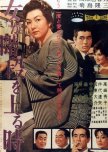
This review may contain spoilers
"The time to decide was looming"
When a Woman Ascends the Stairs showcased Takamine Hideko's acting range as Yashiro Keiko, a bar hostess who had come to a crossroads in her life. Elegant with a backbone of steel, Keiko struggled endlessly to do the right thing when doing the morally gray thing could deliver her dream of buying her own bar far quicker. Director Naruse never took it easy on his characters and Keiko was no exception, watching her courageously face setbacks with a concentrated determination was highly compelling."I hated climbing those stairs more than anything."
Keiko worked upstairs in a bar that catered to businessman entertaining their clients. The men liked having a pretty woman or two around as they made their deals. Because she was a widow in her 30's the younger hostesses and even the patrons called her Mama. Keiko and the bar manager (charismatic Nakadai Tatsuya) also dealt with the business side of collecting from the companies and businessmen who owed on their tabs. Keiko hated her job, but needed the money as she also provided for her mother and adult brother and young nephew. She had three choices to better her life—get married, buy her own bar, or find a patron to help supplement her lifestyle. At her age, she didn't think the first one was a possibility. Buying a bar required more cash than she had. The third one was a form a prostitution she wasn't ready to submit to.
"The best go by cab, the second-rate take the train, and the worst go off with their customers."
One of the younger women had left and started her own bar, but she found herself swimming in debt with creditors hounding her every move. Another hostess married and moved away. A third young woman had no problem exchanging sex for money. Wealthy customer Goda offered Keiko the capital to start a bar if she would be his mistress. A likeable customer proposed to Keiko and for a moment she was happy until she realized he had not been truthful with her. The man she had fallen in love with was also living a double-life. Every time it looked like she might have found happiness or an answer to her problems, fate was waiting around the corner to trample her. Despite always seeking to do the right thing she was seldom rewarded for it. This was Naruse, not Ozu, so not surprisingly the characters fought to survive and make a living, let alone find love. He preferred a more pessimistic worldview where obstacles confronted or crushed his characters at every opportunity. Whether it was more realistic is up for debate, but the conflicts and character growth did make for an entertaining film.
"Women working in the Ginza fought desperately for survival…it was a battle she couldn't afford to lose."
Keiko strove to get ahead financially only to have her family continually siphoning off her savings. She didn't enjoy drinking but did so to make money. She despised drunks pawing at her, but she tolerated them to make money. What she wasn't willing to do was to sell herself. During one particularly poignant moment near the end of the film, she revealed her character's strength and resolve in a captivating way that left her integrity intact.
"There are limits, even in business."
Beautiful Takamine Hideko brought an elegant grace and strength to Keiko. I thought she did a wonderful job of conveying a wide gamut of emotions, subtly and effectively. When she emoted more forcefully with anger or sorrow, it was believable and organic to the scenes. Mama was a complex character who wasn't perfect, she made mistakes but she also took care of the people around her. She knew when to draw the line with problematic behavior and when to walk away. She didn't rail at the patriarchal society that limited her options or the widening division of the classes. Keiko took her blows, dusted off her kimono, got back up and kept moving forward even when life refused to offer her something better. As the people around her encouraged her to loosen her grip on her integrity, Keiko stayed true to who she was. After weathering numerous personal storms and losses she refused to buckle. Whether it was acceptance or resignation, she continued to walk up the stairs she dreaded, paste on a fake welcoming smile, and somewhere deep inside hope that her efforts would grant her the future she dreamed of someday.
"…the trees that line the streets can sprout new buds no matter how cold the wind. I too must be just as strong as the winds that gust around me."
8/1/23
Was this review helpful to you?
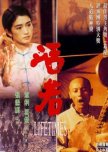
This review may contain spoilers
"...and life will get better and better..."
To Live aka Lifetimes put Zhang Yi Mou and Gong Li in the penalty box for two years due to what was considered a critical view of some of the Chinese government's policies. The film followed a family from the Civil War in the 1940's into the Cultural Revolution. The little family chose to adapt and to do what was necessary to live as the volatile political climate changed around them.Xu Fu Gui (Ge You) was an inveterate gambler married to Jia Zhen (Gong Li) with a young daughter and a baby on the way. His gambling caused him to lose the family mansion and his wife. Fu Gui lived in dire poverty with his mother as he attempted to sell thread and needles on the street. Jia Zhen came back to him with his daughter, now a mute due to a fever, and a baby boy when she heard he'd stopped gambling. Gifted a box with an elaborate shadow puppet set by the same man who maneuvered him into his losses, Fu Gui created a traveling troupe and took his show on the road.
While on the road, Fu Gui and his friend Chun Sheng become conscripted into the Nationalist army where they pull canons and entertain the troops with their shadow puppet show. The Red army overruns the Nationalist army and they end up doing the same thing for the other side. Fu Gui is finally able to go home and he finds a very different environment. His wife and kids are selling and delivering drinking water. Nui, a local communist leader oversees their neighborhood. Long Er, the man who ended up with their mansion was executed for being a counterrevolutionary after burning the house when the government tried to confiscate it. Fu Gui declares it's good they are poor and that he'd lost their house or he would have been the one executed.
The 1950's arrive and during the Great Leap Forward everyone is required to "donate" all of the iron items they own leaving them without cooking utensils. As Nui states, "We're racing toward communism and you're worried about food?" You Qing, their son, fights back against his sister's bullies and the family is almost labeled saboteurs. The next morning, after very little sleep he and all of the other young school boys are required to smelt iron. His mother tries to keep him home but Fu Gui is afraid of the repercussions if the child doesn't go. Tragedy strikes and an old family friend is reminded that he owes them a life.
The 1960's bring the Cultural Revolution. Fu Gui is ordered to burn his shadow puppets or risk being declared a capitalist. The neighborhood and homes are covered in Mao propaganda and images. Their daughter Feng Xia is wed to a lame Red Guard leader at a factory. When the time comes for her to birth their child, her parents discover that all of the doctors and medical professors have been imprisoned for being reactionaries with only young student zealots left. Feng Xia's husband brings an imprisoned doctor to help, but he's starving and of no use.
Some of the family's own choices led to their suffering as in Fu Gui's disastrous gambling habit. But the political situations had more than their share of tragic effects on the family. The lack of sleep so many suffered from caused a death. Locking away doctors and intellectuals left people vulnerable to unskilled students. With only one party, corruption or paranoia could lead to innocent people being arrested as capitalists, especially when no dissenting opinions were allowed.
Fu Gui's shadow puppets became symbols for part of the story's theme. Initially, they were used only for entertainment with the artistic freedom to make the show lewd or comical. Later the puppets told more propagandistic stories. Eventually, Fu Gui was forced to burn them lest their feudal and subversive nature land him in prison. His family became part of the neighborhood theater instead. When Feng Xia married, the song sung, toasts given, pictures taken, and even the presents all revolved around Mao. They didn't even have the freedom to say, "thanks, that's just what we needed, another Mao statue/picture/mural/book" as they glance over at the table and walls filled with them. The family never complained as the political landscapes changed, they merely dressed the part and endeavored to recite the party lines whatever they were. Only at You Qing's grave did the family crack, removing their masks and let loose their true feelings toward the governmental perpetrator.
The performances were phenomenal. Ge You gave an outstanding performance as the complex Fu Gui. He won a Best Actor award at the Cannes Film Festival. The film also won the Grand Prix award. Gong Li's part was smaller as the wife and mother, but her performance was powerful and compelling. Her tears, dignity, and rage pulled me in and never seemed contrived.
To Live showed how people adapt and survive even in tumultuous and dangerous times. The family conformed and persevered clinging to each other in order to live. Once he kicked his gambling habit Fu Gui realized why he wanted to live---his family. "There's nothing like family." Despite tragedies, Jia Zhen only desired "…a quiet life together" and repeatedly and doggedly chose to live. Together they weathered the political changes that created financial and social upheavals in their lives, never letting hope completely die. As Fu Gui declared to his grandson, "life will get better and better" without any evidence that it would yet he still chose to live in expectancy. To Live used the political changes as a structure to show how people are able to endure and to live with dignity even when the world tumbles around them. Zhang Yi Mou made a beautiful film about the tenacity of the human spirit and one well worth trying.
6/9/23
Was this review helpful to you?

This review may contain spoilers
A picture is worth a thousand words, or is it?
If you are not old enough to remember rolls of film, one of the commonly used rolls had 36 shots on it. This film was told in 36 segments based largely on camera shots or the memories from those shots as if labeling a picture or a memory. The film leisurely and gently explored the relevancy between photos and memories and the malleability and impermanence of both.Sai is a film location scout and Oom is the art director. They meet scouting out an abandoned love hotel from the Vietnam War era that Sai has memories of being in her old neighborhood. Sai uses a digital camera, taking many pictures that she will later store and keep. Oom still uses a film camera and often takes pictures of people when they aren't looking even though he refuses to have his picture taken. Though he says he will send them a copy, he rarely does. The two spend a lot of time discovering the nooks and crannies of the possible set and also negotiate with the landlady over room prices for the cast and crew. Oom takes a picture of Gita, the landlady's 12-year-old daughter that later may prove important. Afterwards, Sai and Oom enjoy an evening breeze from the roof and take their picture with her camera in front of the beautiful sky. Soon the "end credits" appear after the 11th shot.
The film jumps into the future 2 years. Sai and Oom have gone their separate ways. When the director she is currently working for discovers the building he built his new script around has been leveled, Sai mentions the other building. She attempts to recover the photos but even after a friend works to restore them, only a few survived and not the one of her and Oom on the rooftop. She returns to the building and talks to the landlady. It turns out Gita died and the landlady would love to have the picture Oom took of her. During the process of trying to find Oom and restore the pictures, she realizes her feelings for him were stronger than she had known. As the film closes in on the 36th segment, Oom looks at the picture of them on the roof faraway on his computer (unknown to her he had copied her images from the shoot long ago), Sai smiles as she remembers the special moment they shared.
36 was shot in an artful way that could also distance the viewer from the characters. Oom is never seen face on, and often shots of other characters were in profile or from behind or even half hidden by architecture. I liked the labeled 36 bits of the story, like looking at a picture album where the photo had been annotated and saved. The OST was also lovely, I especially enjoyed the piano music.
Just as film cameras have mostly transitioned over to digital cameras so are most movies now shot with digital film. The danger of digital film was also addressed in that backups are necessary, because once a disk or other device has been damaged the pictures are likely lost for good. Her friend Kai mentioned how many people brought hard drives to be fixed saying they needed them immediately, but instead never returned for them. A drawerful of memories lay untouched. For one reluctant woman who came to pick hers up, he offered to erase those memories.
Which is more important? To see a bird or to take a picture of it? To experience the person you are with, or only the relative engagement of photos? The argument is made for both the value of the human experience and memory as well as the memories that are brought back by glancing at a photo. For the director whose childhood building was destroyed a picture is all that is left of it and his memories. Ironically, at the end of the movie, Oom who always valued the human experience more is found looking at Sai's picture and reminiscing. Conversely, Sai goes back to the place they shared and the memory floods her mind as she gazes fondly to where they had been together. Memory is a fragile, fading construct of the mind, subject to change. While memories are important, photos help to shore up the time and events. Buildings crumble, people die, digital photos can be erased, photos fade and relationships shatter, 36 touched on the concept of impermanence as well. There comes a time when no one remembers the people or places in the pictures.
While I enjoyed this film, it also failed to emotionally capture me with the relationships involved. The ending was meaningful to the arguments of photo or memory, but it left a hole in the picture I had hoped to find. I was hoping for a 37th epilogue image or a new roll of film to begin. This is a very slow, artful movie, more philosophical than touching. Yet for its shortcomings I did find it engaging. If this genre is of interest to you, it would be well worth trying.
5/23/23
Was this review helpful to you?
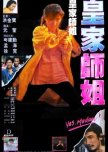
This review may contain spoilers
"When will you become an honest crook?"
Yes, Madam! starring Michelle Yeoh and Cynthia Rothrock opened the door for the girls with guns genre. When they were fighting on screen they were a sheer joy to watch. Sadly, as often happens in a movie starring a woman, the majority of scenes focused on the bumbling male thieves and the Big Bad, leaving the women almost relegated to supporting roles.Two hapless hoods and their idiot forger friend get tangled up in triad boss James Tien's murderous methods for trying to retrieve microfilm a Scotland Yard detective had acquired of his illegal dealings. Dick Wei plays his vicious assassin who attempts to track down the damning evidence. Scotland Yard sends Cynthia to Hong Kong to join up with Michelle to investigate and discover who killed the British agent. The women are initially hostile with each other. Cynthia's methods are violent and she has a massive chip on her shoulder and hair-trigger temper compared to Michelle's calmer way of doing business and dealing with suspects. Before you can say Best Friends Forever, the two become battle buddies and it's on like Donkey Kong when they take on Hong Kong's worst.
Much of the film focuses on the bumbling crooks. Tsui Hark, Mang Hoi, and John Shum have their funny moments but they have more screen time and character development than the two leading ladies. James Tien and Dick Wei make for menacing enough, and in Tien's case, annoying enough criminals. Michelle Yeoh in her first starring role shone whenever she was given the chance. Cynthia Rothrock's fighting was much better than her acting but since that's when the women were together for the most part, it worked. As I've mentioned it would have given more dramatic depth to have the women be more than just fighting machines and learn more about them. Their characters were thinly drawn.
The script was uneven and the story in the middle of the film, felt repetitive and began to drag. How many times did we have to see Tsui Hark try to escape from bad guys in his rigged apartment? Or Hoi and Shum running afoul of baddies and getting beaten up and saved at the last minute? Some of the scenes were genuinely funny, but others began to wear thin.
What made this film memorable were the stunts. The opening scene's stunts were dynamic and breathtaking. The final fights at the Big Bad's mansion were brutally delicious. They were fast, creative, and dangerous. Michelle and Cynthia along with countless stuntmen hit the ground hard and some hit hard on architectural elements. Broken glass, broken furniture, broken bodies. The action took place with a bare minimum of wire work. This was all hard hitting, hard kicking, flipping, falling kung fu.
The women's clothes reflected the 1980's styles. They looked like a female version of Crockett and Tubbs from Miami Vice with their upturned colors and Flight of Seagulls' hairstyles. The music was bad 80's generic cop synth offerings. And the police brutality was showing its age as well. But all of this was to be expected from this era.
Given the title, Yes Madam, I would have liked to have seen this film through the eyes of Michelle Yeoh's character as she has to work with a strong willed foreigner and how they hunted down their suspects and developed a buddy camaraderie. Instead, most of the movie was shown through the criminal losers' perspective. As exciting as it was to watch the two women in action in those thrilling fights it didn't quite make up for them being largely window dressing in their own movie. And it didn't quite make up for the tedium of much of the movie when they weren't featured. I can appreciate the historical context of the film and how it gave women more interesting roles afterwards, but also see where they were afraid to completely leave it in their hands to carry the film. Michelle Yeoh is a favorite of mine and when given the chance she showed what star quality was, too bad they didn't let her shine more.
3/10/23
Was this review helpful to you?

This review may contain spoilers
We are the stories we tell
Taipei Exchanges is a gently introspective slice of life about two sisters who ponder what stories hold value when they set up a barter system in their coffee shop. This film is not for everyone. The changes in the sisters and their customers are small and quiet and will go unnoticed if you don't pay attention from your table in the corner of their café. If coffee and discovering the meaning behind the stories people tell about their lives and belongings interest you, pull up a chair, order a coffee and cookie and see where the film and memory takes you.If someone gave you the money to do one, which would it be? Use the money to study or travel?
Doris is practical and has always wanted to open an elegant coffee café. When she finally has the opportunity fate turns her dream into the quirkiest shop in Taipei. Without giving too much away, on her opening day she ends up with a plethora of calla lilies and invites people to bring something to exchange for them. Afterwards with their shop full of junk, her sister has the idea that customers can bring something to exchange for whatever is in the shop thinking it will create more foot traffic and people will stay longer and drink and eat more. Doris reluctantly agrees hoping it will lead to financial freedom for her. Josie wants a car for herself and a set of bone china for her mother.
Along the way, the sisters find that what things are worth is a deeply personal belief. What is the story behind it? Love letters, songs, a mirror ball, stuffed alligator, and even cleaning out the backyard drain are up for exchange. As Doris hears the stories of the places people have traveled, a shift begins to take place in her.
What do you treasure the most?
Doris makes a decision that seems radical and perhaps it's radical self-love to realize that what we value may change over time. The sisters believe that whatever you are looking for someone has and it's only a matter of time before the need to have and the need to release meet each other. Often our lives can be changed by one small incident and decision, in Doris' case a fender bender with a small truck full of calla lilies led to small change after small change leading to a larger change in her life and the lives of those around her.
Taipei Exchanges is beautifully and thoughtfully shot, within the store and around Taipei. The OST is soothing and won't jar you out of the existential questions that arise over what we value, why, and what is our inner value to ourselves and others. For the most part the acting is natural and the sisters have good chemistry in the way that sisters love each other still bicker. Some of the basic business issues are touched upon when starting up a business, but don't weigh the story down. People off the street answer two of the questions above and though some may sound more scripted, others are quite relatable.
Everyday we tell ourselves stories about our failures, hopes, dreams, and even the lies about ourselves that help us sleep at night. We cherish the stories behind an object or even despise an object because of the emotional baggage that it carries. Is a song worth a book? A Barbie dollhouse worth a mirror ball? What happens when people exchange goals and dreams? This film will not turn your world upside down, but it may cause you to take a moment to look around and even within yourself and wonder what has value and why?
If you had the choice between money and calla lilies, which would you take?
2/24/23
Was this review helpful to you?

This review may contain spoilers
"Of all the poisons, men are the most dangerous!"
Monkey King 3 took up where Monkey King 2 left off. Aaron Kwok returned as the Monkey King along with Feng Shao Feng, Xiao Shen Yang, and Him Law. Zhao Li Ying joined them this time as the Queen of the Women’s Kingdom.Wu Kong, Pigsy, Sandy, and Tang Seng are heading west on a river when a river demon assaults them. There’s an old joke, “You can lead a horse to water but you can’t make him ski.” This was as close to a skiing horse as you are likely to see! With the help of the goddess they escape and go from the frying pan into the fire. They crash through the portal into Woman Land where Tang Seng and the Queen seem to fall in love as they plummet down a mountain. The Preceptor, a very uptight woman dressed in white, declares the men must die because they have made the cardinal sin…of being men. Men’s love is poison to a woman and it’s looking like the Queen might have been infected. She rescues them during their execution and they seek to find a way out of the spell dome over the land.
The CGI was good for the most part and there was a lot of it. Woman’s Land had beautiful dwellings and strange monsters abounded.
Aaron Kwok is the best Monkey King I’ve seen. Too bad he had very little to do in this movie. This story was more of a romance and spiritual trial than adventure. Even the “villain” was just misunderstood and hurting. Tang Seng and the Queen had to decide between love and duty as did the Preceptor. Even if you are like me and only know the story from the movies, the ending was inevitable.
I had reservations about certain aspects of the story. The one whom the Preceptor had loved during her youth was an androgynous river god. Years before because of her duty to the new queen, the Preceptor had to reject the river god who then became unproductive, obsessive and wrathful. The spirit who could cause miscarriages appeared to be a man in woman’s clothing which was played for laughs. Not very 2018 of them on either count, neither was portrayed positively. The men ended up pregnant, very pregnant after accidentally ingesting the water from the river of womanhood. Setting aside the biological issues, and regardless of your stance on abortion, there were forced abortions. Finally, though the women seem to be well trained warriors, they still had to rely on the men to solve their problems and ultimately decided maternal love was greater than romantic love. Seemed like this movie could have at least tried to give them more agency and views on loving. There were also a couple of deus ex machina moments that took the tension out of volatile, dangerous moments.
Tang Seng wrestled with wanting it both ways. He wanted the Queen and he wanted to save humankind from suffering. He believed sensual love would weaken his soul. Ultimately, he and the Queen were able to live with their decisions because they faced the problems head on and made their choices freely. Perhaps the Goddess sent him to Woman Land, because just like heartache, you can’t understand love unless you’ve felt it and lived through it.
If you are wanting to watch a movie featuring the Monkey King, this is not it. He is a supporting character to the love story. The love story was hard for me to accept as they fell instantly in love as if they’d been poisoned, knowing nothing about the other person. Zhao Yi Ling and Feng Shao Feng did their best to convince me, and it almost worked. They were lovely to look at and capable actors. Ultimately, this felt more about duty than love even if Tang Seng believed loving one was the same as loving everyone.
11/19/22
Was this review helpful to you?

 97
97 343
343 13
13 3
3 2
2 3
3 6
6 1
1 5
5 1
1 1
1 2
2 4
4 5
5






















